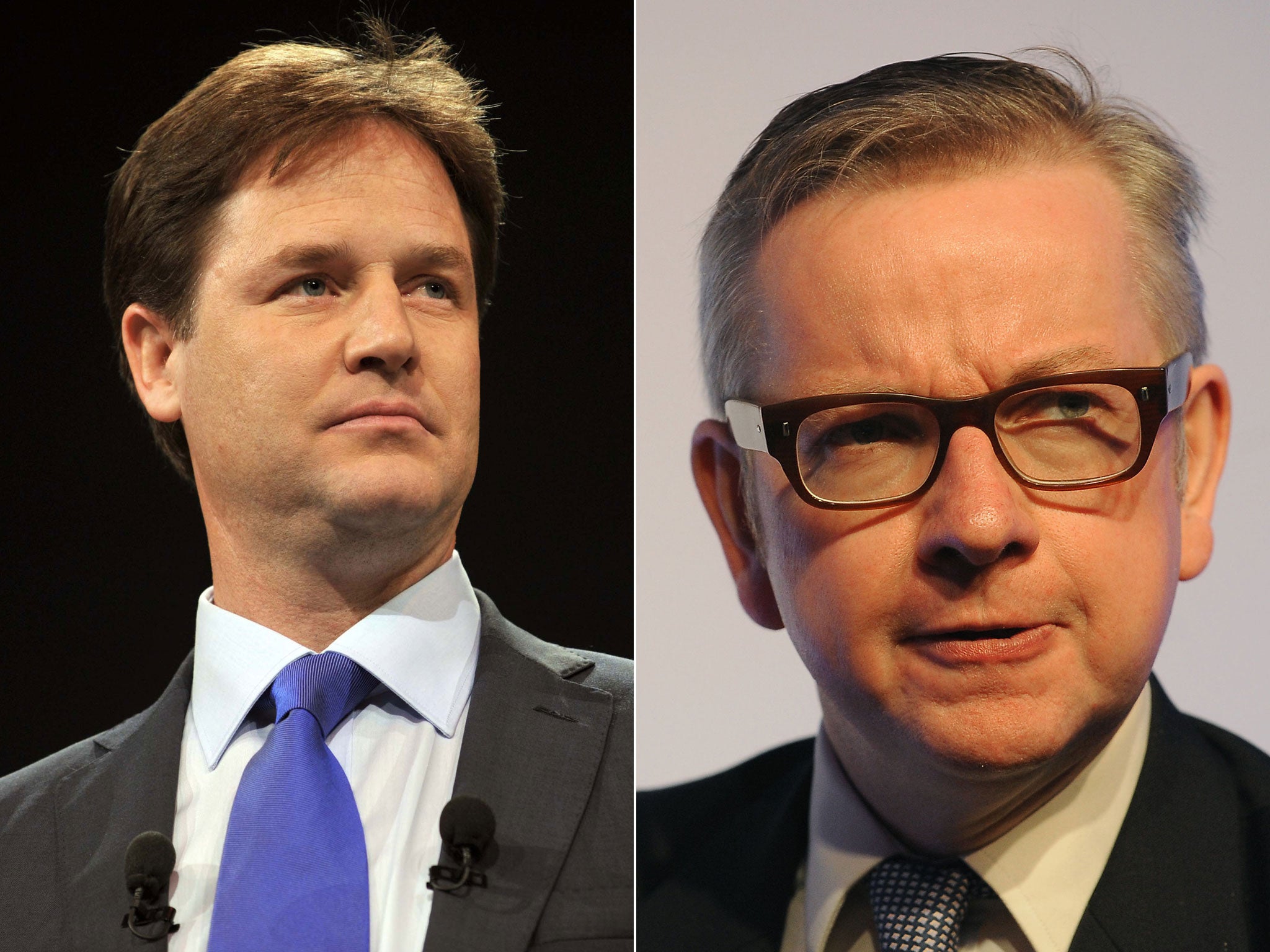Blog post provides a rare insight into what goes on in a coalition
It is a remarkable document... setting out how the war between Michael Gove and Nick Clegg was fought


It is not every day that we are supplied with a transcript of the previous day's private conversations between the Prime Minister and his deputy, so we should read, mark and learn while we have the chance.
Apparently, Nick Clegg "stormed" along the corridor from his office in the Cabinet Office through the back of No 10 to see David Cameron on Wednesday. "Gove's making me look a fool," Clegg said, and demanded that Cameron make the Education Secretary write a joint article with David Laws, the Liberal Democrat Education minister, to say how united they were.
Cameron, "wearily, with that bored, pained expression he gets", replied: "Yes, OK. Ed will call him if you really want, Nick. You did say on Monday that it'd be best to pipe down, though. Are you sure this is wise?"
"Yes. If Gove signs up then the media will change the story. They'll see Cummings is lying."
"Mm. OK." Cameron turned to Ed Llewellyn, chief of staff: "Ed, call Gove. He'll play ball, Nick, don't worry."
This account was provided to Dominic Cummings, who was special adviser to Michael Gove until January, by "a mole", and Cummings put it on his blog on Thursday. That was not all. The blog post is a remarkable document, setting out how the war between Gove and Clegg was fought. It is one-sided, of course, portraying Clegg as a histrionic opportunist, but also describes in some detail how Clegg bounced Gove into getting what the Lib Dems wanted and how both sides leaked against each other. It will provide students on the "Cabinet and Premiership" course run by my colleagues at Queen Mary University of London with a case study of coalition government for decades to come.
For four years, I have been telling students that a big difference between the old Labour government and this coalition is that, before 2010, two sides in government hated each other and behaved unreasonably, whereas since then two separate parties have worked together well with mutual respect.
That assessment now needs to be amended. The coalition turns out to be just as dysfunctional as the tantrum and sulk-strewn Blair-Brown alliance. Clegg was so incensed by Cummings's blog that he demanded to know if its author could actually be arrested for breaking the Official Secrets Act.
Cummings, whom I have never met, is an unusual person. He is clever, judging by his grand "Some thoughts on education and political priorities", published last year, on the mediocrity of English education and his ambitions for it. But he is also recklessly destructive, not just of his own reputation but of Gove's. His blog analyses Clegg's desperation to repair the damage of his tuition fees U-turn, and it accurately diagnoses the flaw in Clegg's tactics. Instead of talking about the Lib Dems' policy of free school meals for all under-eights, the media are full of coalition-split stories. But by fighting back, Cummings makes it harder for Gove to succeed.
Yet it is a strange feature of government by screaming match, leak and bounce that the policies often turn out all right. This was true under Blair and Brown and is true now.
Universal school lunches are not a bad idea. You could argue – Gove did and Cummings still does – that the money could be better spent elsewhere. But, as Gove and Laws put it in their joint message composed under duress, pilot schemes have shown that pupils are better fed and learn better.
The policies that go horribly wrong, from the top-down reorganisation of the NHS to universal credit, are the ones that haven't been fought over between the coalition parties in advance. The school lunches plan was forced on Gove by Clegg without being fully thought through and before the funding had been sorted out. But that is how politics normally works: the early days of coalition sweetness and light were the aberration, not the norm.
It is a difficult balance. I would argue that most of the time the friction between Blair and Brown produced good policy. In the late Blair years, Brown's obstruction was damaging, but then when Brown became PM policy-making suffered more for the opposite reason: because Brown didn't have Blair to push against.
Now there is another complication. As Sean Kemp, Clegg's former spokesman, told me, Cummings "doesn't get that the Tories don't have a majority – they can't just get their own way, because they didn't get enough votes".
Under the coalition, Gove has achieved a great deal: he has been passionate, focused and driven, and Cummings takes all those qualities past the point where they are helpful. They certainly don't help with Gove's big problem: that most teachers think he doesn't value them and they hate him quite unreasonably as a result.
He needs allies, and now he hasn't got them.

Join our commenting forum
Join thought-provoking conversations, follow other Independent readers and see their replies